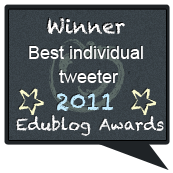 Last week I introduced you to my Essential Tools For The Connected Teacher, where each week I will give you some ideas of the tools teachers need to have in their Web 2.0 Teaching Toolkit. In part 1 we looked at Tools For Communication. For the next 2 weeks we will look at Tools For Collaboration. Up this week, Collaboration With Students.
Last week I introduced you to my Essential Tools For The Connected Teacher, where each week I will give you some ideas of the tools teachers need to have in their Web 2.0 Teaching Toolkit. In part 1 we looked at Tools For Communication. For the next 2 weeks we will look at Tools For Collaboration. Up this week, Collaboration With Students.One of the most important skills we need to teach our students is the ability to work with others; collaboration. What is so awesome is that there are some great, free tools you can use to help foster a "collaboration-rich" environment.
Week 2- Collaboration With Students
____________________________________________________
Google Docs- How many times have you heard the same, sad story from your students that they forgot their paper at home, they couldn't print it because the Media Center was closed, or they lost their flash drive? With Google Docs there might not be any more excuses.
First What Is Google Docs? See how Michael gets help from his friends writing a letter to his "special friend."
So as you can see, Google Docs allows for document creation and sharing. Students can collaborate on writing projects and don't need 2 copies. What is even more nifty about Docs is that it is semi-real time. Meaning that if 2 students are making changes to the same doc, as soon as the doc is saved the changes immediately show on all versions.
Besides a Document editor there is a Spreadsheet tool, Presentation tool, and a Forms tool which is great for data collection. And all the information collected from the Form goes straight into a Spreadsheet!
21 Interesting Ways To Use Google Docs In The Classroom- In this presentation (using Google Docs) learn some really creative ways to use Docs for learning.
Google Docs In Education- From the Google Guys themselves tons of information and ideas on using Docs with your students.
6 Tips To Get The Most Out of Google Docs- Some really good tips here I wish I had when I was starting out.
____________________________________________________
Wikis- Wiki what? Wiki is a Hawaiian word meaning "fast." Wikis are websites that allow anyone with access the ability to create and edit pages, with little knowledge of webpage creation. I tell teachers if you can write a document, you can create a wiki.
Here is a great video from the Plain English folks on Wikis
There are lots of great wiki services out there. 2 of the most popular with educators are PBWorks and Wikispaces. Each has advantages and disadvantages, however they both have wonderful education only features.
Wikis In Education- Built on a wiki, learn all the different ways wikis are used in the classroom.
Getting Tricky With Wikis- Specific to Wikispaces, this wiki will guide you through the entire creation process from how to add students as contributors to how to add gadgets and do-dads to make it really cool.
Educational Wikis- Tons of class and school wikis here to give you an idea on how others are using them.
____________________________________________________
Edmodo- This is a service I just discovered earlier this year after seeing several comments about it on Twitter. Once I got in a played around with it I feel in love and saw the potential.
It is a free, private space where teachers can post assignments, upload and download student files, create discussion boards
Edmodo Tutorial Video- An introduction to the site and some great information on getting started.
7 Quick Reasons Edmodo Is Great- I am sure there are more, but here are some to consider.
Edmodo In A Middle School Language Arts Classroom- Here is the story about how one teacher changed the way her kids were learning and collaborating by using Edmodo.
____________________________________________________
Social Bookmarking- Huh? I remember when this Internet thing really took over. At first you were going to visit a website over and over, you had to remember the address. Then Favorites and Bookmarks were introduced. So it was easy to revisit links, even if you forgot the address. But now we take the Internet with us on laptops and smartphones. In the classroom if you want to do a lesson in a computer lab or on laptops and you had several links you wanted students to visit there was not a very easy way to share those links, until now.
With social bookmarking all the links are saved online. So, that means they can be accessed any where you have an Internet connection. (I must confess, I have no bookmarks in my browser. They are all online.) Services like Diigo and Delicious also allow for tagging (or assigning key words) so you can find what you need even fast. Students can create their own accounts and share links for projects and assignments.
Social Bookmarking In Plain English- Another great explanation from the Plain English Guys.
Diigo In Education- One of the best presentations out there on how to use the powerful education features found in Diigo.
Social Bookmarking and Annotating- Tips and Tricks from one amazing teacher on how he uses Social Bookmarking for collaboration in this classroom.
____________________________________________________
So, here are 4 more tools to explore this week and to add to your toolbox.
Next week we will look at Tools To Collaborate With Other Professionals.
Image from Google CC Search. View the original here.








Thank you for this amazingly informative blog, as a teacher struggling to understand web 2.0 by herself this was just what i needed.
ReplyDelete